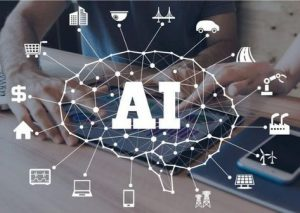A Thrilling Race in the World of AI
The rapidly evolving world of Artificial Intelligence (AI) has seen Google hold the reins as the dominant force for years. However, recent developments by tech giant Microsoft have cast doubt on Google’s supremacy in the AI space. As Microsoft gains ground with innovative advancements in the field of artificial intelligence, it poses the question of whether Google is losing its edge in this critical arena. With Microsoft’s ChatGPT and Google’s Bard, the AI race is getting closer by the day, waiting to see who comes on top.

Source: Tech Talks
Microsoft’s Strides in AI Development
Microsoft’s recent accomplishments in artificial intelligence are putting significant pressure on Google. The innovations include the impressive ChatGPT chatbot, Microsoft Edge’s AI enhancements, and the integration of AI “Co-pilot” with Bing and Office 365. These developments signal Microsoft’s unwavering commitment to staying ahead in the race.

The powerful natural language processing capabilities of Microsoft’s ChatGPT have received considerable attention, making it a significant competitor to Google’s AI solutions. Furthermore, Microsoft’s Co-pilot is already improving search and productivity experiences across the company’s product ecosystem.
Also Read: Elevate Your Workflow: Microsoft’s Copilot Boosts Office, GitHub, Bing & Cybersecurity
Google’s Bard: Lagging Behind Microsoft’s ChatGPT
As competition in the AI space intensifies, it is essential to compare Google’s AI chatbot, Bard, to Microsoft’s ChatGPT. Although Google has historically led innovation, Bard appears to trail behind ChatGPT in both technology and versatility.

Source: Pinterest
One of Bard’s significant shortcomings is its inability to integrate with Google Search, an area where Microsoft’s ChatGPT excels. Moreover, Bard has yet to achieve the level of user experience and effectiveness that ChatGPT already provides. As Microsoft continues to expand its AI capabilities, Google has much catching up to do in the chatbot space.
Google’s Response: Strengthening AI With Nora
In a bid to stay competitive, Google has introduced its Nora algorithms. They aim to provide artificially intelligent solutions on par with Microsoft. The company hopes to maintain a strong foothold in the AI market by integrating Nora into Google search. This will help offer diverse perspectives on user queries similar to ChatGPT’s algorithm.
Google Maps has also seen significant improvements. Some improvements are augmented reality features and an updated camera search function for places of interest. These enhancements demonstrate its dedication to remaining at the forefront of the AI landscape.
A Setback for Google
Google recently faced criticism when its ChatGPT rival, Bard, made a glaring error during a presentation. This incident, widely discussed on social media, put Google’s AI capabilities under the microscope. It also further fueled concerns about its position in the AI race.
Microsoft’s Plan: AI Integration in All Products
Microsoft has strategically incorporated artificial intelligence into all its products, beginning with the Bing search engine. Leveraging the next-generation OpenAI language model, Prometheus, Microsoft aims to boost Bing’s performance and user experience across various aspects. This will ultimately put the search engine on a higher pedestal than Google.
The integration of OpenAI into Edge has given Microsoft an edge over Google, enabling a more natural understanding of user queries. As AI continues to evolve, search engines will become more sophisticated, ultimately revolutionizing how users engage with the internet.
Financial Stakes for Google
As the battle for AI dominance intensifies, the financial implications for Google are critical. A significant portion of the company’s revenue comes from online advertising, with Google Search playing a pivotal role. Any negative impact on Google Search could have far-reaching consequences for the company.
With Microsoft’s advancements in AI-powered search engines, Google must remain competitive and retain its market share. Losing ground in the AI race could potentially undermine Google’s position as an industry leader and threaten its overall financial stability.
Also Read: Replit & Google Cloud Join Hands for AI-Driven Software Development
A Defining Moment in the AI Landscape

Source: Pinterest
The ongoing rivalry between Google and Microsoft highlights a defining moment in the tech industry. As both companies invest in AI research and development, they are shaping the future of innovation and setting the stage for transformative advancements in various fields. AI’s potential impact spans from search engines and virtual assistants to healthcare, education, and transportation. The race for AI supremacy is not merely a contest between two tech giants. It is also an opportunity for the entire industry to benefit from groundbreaking innovations that could reshape our daily lives.
The Future of AI: An Epic Battle Between Google and Microsoft
The AI race between Google and Microsoft is heating up, with both companies vying for the top spot in this crucial technological domain. Microsoft’s commitment to integrating AI across its product range has undoubtedly raised the stakes for Google, which must now innovate and adapt to stay ahead in the market.

Source: Pinterest
While Google has faced challenges and setbacks, its ongoing efforts to enhance its AI capabilities and product offerings demonstrate its determination to remain competitive. As the tech giants continue to innovate and push boundaries, the future of AI promises to be a thrilling contest with transformative potential. Ultimately, the winner of this race may be less important than the collective progress achieved, which has the power to revolutionize industries, improve lives, and redefine the future of technology.
Our Say
The competition between Google and Microsoft is becoming increasingly fierce as both companies strive to lead the artificial intelligence domain. Microsoft’s recent advancements and commitment to AI integration have put significant pressure on Google to maintain its market position and stay ahead in the game.
Despite facing challenges and setbacks, Google’s efforts to improve its AI capabilities and product offerings indicate a strong determination to remain competitive. These tech giants continue to innovate and push the limits, demonstrating the potential to revolutionize industries, improve lives, and redefine the future of technology. The future of artificial intelligence, therefore, promises to be an epic battle that could reshape the technology landscape and bring about transformative change.
Featured image source: www.scotsman.com





